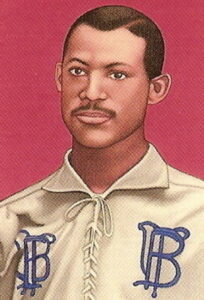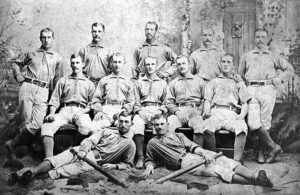Most people believe that it was Jackie Robinson that broke the color barrier in baseball when he played a game for the Brooklyn Dodgers in 1947. That may be true, but he was not the first black man to play in the Majors Leagues. That story is an indictment of the evils of segregation, Jim Crow laws and basic racial discrimination.
 A young student athlete at the University of Michigan named Moses “Fleet” Walker had the distinction of being the first black player in the Major Leagues.
A young student athlete at the University of Michigan named Moses “Fleet” Walker had the distinction of being the first black player in the Major Leagues.
In 1881, Moses was playing for a semi-pro team in Cleveland. At that time players could play semi-pro and college baseball simultaneously. The semi-pro team traveled to Louisville, Ky. to play a game. When they arrived, Walker was not allowed to stay at the same hotel as his team. The situation got worse once the game was to start. Members of the Louisville team refused to play if Walker played. Cleveland relented and started a different catcher. After one inning that catcher could not continue due to an injury. When Moses took the field, Louisville players refused to play and the Cleveland third Baseman took over at catcher so that Moses would not play in the game. This was a premonition of Walker’s future in baseball.
Moses Walker had a unique baseball skill as a top level defensive catcher. In those days the catchers used little equipment and often caught barehanded. Injuries were common. Known as a great defensive catcher, Walker signed a professional baseball contract in 1883 with the Toledo Blue Stockings. In 1884 the Blue Stocking joined the Major Leagues for one season. They had black players. After Moses joined the team, his brother, Weldy also joined. With the Walker brothers on the team, they became the first black players in Major League Baseball.
The 1884 season was filled with conflicts and injuries for Moses. Often his pitchers would throw a different pitch than was called so as to try and injure their catcher. It worked as Moses was only able to play in 42 out of 104 games. At the end of the season Toledo released the Walker brothers. Moses was able to find work in the International League, a minor league team playing mostly in northern cities. He ended up playing for the Syracuse Stars. However, by August 1889, he was released from the team. No black player played in the International League again until Jackie Robinson played for the Montreal Royals in 1946.
Later in 1889, led by Hall of Famer Cap Anson of the White Sox, the major league owners entered into a “gentleman’s agreement”. These so-called gentlemen agreed to never let a black player into the major leagues. They kept this agreement for 57 years. This was done in reaction to a talented, well-educated baseball player who never caused a problem for baseball other than that he existed and wanted to play a game he loved.
 The “gentleman’s agreement” of 1889 gave a victory to hatred and ignorance. I don’t know if we will ever know the real cost of this tragedy. However, as a baseball fan only, I was denied learning about the true talent of Josh Gibson, Satchel Paige, Cool Papa Bell and Buck Leonard just to name a few. As a child I can’t imagine a game without Willie Mays, Hank Aaron, Frank Robinson or Bob Gibson. My father, as he grew up, only knew of white players.
The “gentleman’s agreement” of 1889 gave a victory to hatred and ignorance. I don’t know if we will ever know the real cost of this tragedy. However, as a baseball fan only, I was denied learning about the true talent of Josh Gibson, Satchel Paige, Cool Papa Bell and Buck Leonard just to name a few. As a child I can’t imagine a game without Willie Mays, Hank Aaron, Frank Robinson or Bob Gibson. My father, as he grew up, only knew of white players.
Another huge injustice may be that history has not noted or recognized Moses Walker for his courage to combat the injustice of segregation. He stands as the “unknown soldier” in a struggle against evil. It seems that prophets often get martyred.
